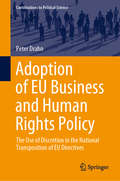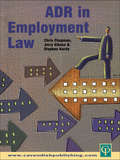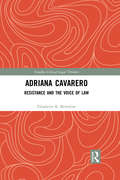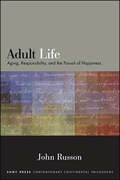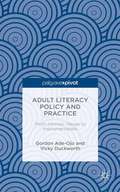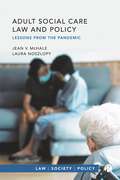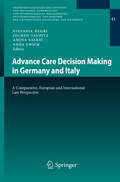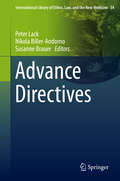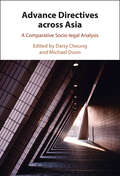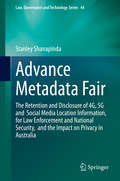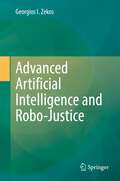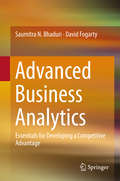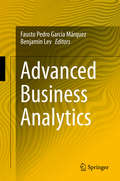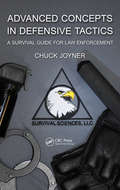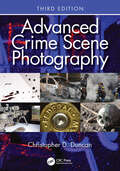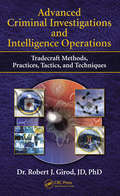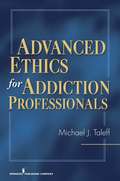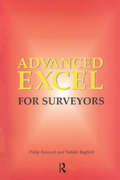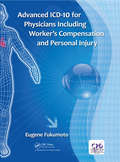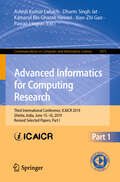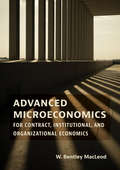- Table View
- List View
Adoption of EU Business and Human Rights Policy: The Use of Discretion in the National Transposition of EU Directives (Contributions to Political Science)
by Peter DrahnThis book explores how and why the transposition of EU directives in the new and contentious policy area ‘Business and Human Rights’ differs between member states. It reveals the extent to which individual member states are pursuing diverging approaches in dealing with the ‘discretionary space’ in EU directives, and highlights theoretical and political explanations. Drawing on historical institutionalism and rational choice institutionalism, the book establishes a link between the degree of corporatism in a given political economy and government behaviour in terms of Business and Human Rights policy. Moreover, it identifies political salience within the policy subsystem as a pertinent factor for explaining national transposition outcomes.
Adorno's Practical Philosophy
by Fabian FreyenhagenAdorno notoriously asserted that there is no 'right' life in our current social world. This assertion has contributed to the widespread perception that his philosophy has no practical import or coherent ethics, and he is often accused of being too negative. Fabian Freyenhagen reconstructs and defends Adorno's practical philosophy in response to these charges. He argues that Adorno's deep pessimism about the contemporary social world is coupled with a strong optimism about human potential, and that this optimism explains his negative views about the social world, and his demand that we resist and change it. He shows that Adorno holds a substantive ethics, albeit one that is minimalist and based on a pluralist conception of the bad - a guide for living less wrongly. His incisive study does much to advance our understanding of Adorno, and is also an important intervention into current debates in moral philosophy.
ADR in Employment Law
by Stephen Hardy Jerry Gibson Chris ChapmanFirst published in 2003. Routledge is an imprint of Taylor & Francis, an informa company.
Adriana Cavarero: Resistance and the Voice of Law (Nomikoi: Critical Legal Thinkers)
by Elisabetta R. BertolinoCritical legal scholars have made us aware that law is made up not only of rules but also of language. But who speaks the language of law? And can one lawfully speak in one’s voice? For the Italian philosopher Adriana Cavarero, to answer these questions we must not separate who is speaking from the very act of speaking; moreover, we must recuperate the material singularity and relationality of the mouth that speaks. Drawing on Cavarero’s work, this book focuses on the potentiality of the voice for resisting law’s sovereign structures. For Cavarero, it is the voice that expresses one’s living and unrepeatable singularity in a way that cannot be subsumed by the universalities and standards of law. The voice is essentially a material and singular passage of air and vibration that necessarily reveals one’s uniqueness in relationality. Speaking discloses this uniqueness, and so one’s vulnerability. It therefore leads to possibilities of resistance that, here, bring a fresh approach to longstanding legal theoretical concerns with singularity, ethics and justice.
Adult Continuing Education and High School Course Catalog
by Hadley Institute for the Blind Visually ImpairedAdult Continuing Education and High School Course Catalog 2016-2017. Catalog of current distance education courses for the blind or visually impaired. Various media for the courses is available including; Braille, CD, Digital Talking Books, Large Print, Online and more. Not all courses are available in all formats.
Adult Life: Aging, Responsibility, and the Pursuit of Happiness (SUNY series in Contemporary Continental Philosophy)
by John RussonWhat does it mean to be an adult? In this original and compelling work, John Russon answers that question by leading us through a series of rich reflections on the psychological and social dimensions of adulthood and by exploring some of the deepest ethical and existential issues that confront human life: intimacy, responsibility, aging, and death. Using his knowledge of the history of philosophy along with the combined resources of psychology, sociology, and anthropology, he explores the behavioral challenges of becoming an adult and examines the intimate relationships that are integral to healthy development. He also studies our experiences of time and space, which address both aging and the crucial role that our material environments play in the formation of our personalities. Of special note is Russon's provocative assessment of the economic and political contexts of contemporary adult life and the distinctive problems they pose. Engaging and accessible, Adult Life is for anyone seeking the profound lessons our human culture has learned about living well.
Adult Literacy Policy and Practice: From Intrinsic Values To Instrumentalism
by Gordon Ade-Ojo Vicky DuckworthThis book explores the gradual evolution of Adult literacy policy from the 1970s using philosophical, sociological and economic frames of reference from a range of perspectives to highlight how priorities have changed. It also offers an alternative curriculum; a transformative model that presents a more socially just different value position.
Adult Social Care Law and Policy: Lessons from the Pandemic (Law, Society, Policy)
by Jean V. McHale Laura NoszlopyAvailable Open Access digitally under CC-BY-NC-ND licence. This book provides an in-depth sociolegal examination of adult social care law and policy during the COVID-19 pandemic. It explores the tensions between legislation, policy, and practice in what was already an under-resourced and overstretched sector. The authors interrogate the vision and utility of the Care Act 2014 and explore the impact of emergency legislation and operational changes implemented during the pandemic. Detailing what happened to social care provision during this time of intense stress and turbulence – for people who draw on services, for informal carers, and for those who work in the sector – the book highlights fault lines in the system. This is an invaluable resource offering timely lessons for adult social care reform and future pandemic preparedness planning.
Adultery: Infidelity and the Law
by Deborah L. RhodeDespite declining prohibitions on sexual relationships, Americans are nearly unanimous in condemning marital infidelity. Deborah Rhode explores why. She exposes the harms that criminalizing adultery inflicts--including civil lawsuits, job termination, and loss of child custody--and makes a case for repealing laws against adultery and polygamy.
Advance Care Decision Making in Germany and Italy: A Comparative, European and International Law Perspective (Veröffentlichungen des Instituts für Deutsches, Europäisches und Internationales Medizinrecht, Gesundheitsrecht und Bioethik der Universitäten Heidelberg und Mannheim #41)
by Jochen Taupitz Stefania Negri Amina Salkić Anna ZwickWhat is the situation of people who are unable to make decisions due to a physical or mental change? This book gives impulses and answers to many ethical, economical and mainly legal questions which arise and are associated with the end of life. A universal human rights approach and the analysis of the relevant European law are put in front of the presentation of the national legal situations in Italy and Germany. The most topical and controversial issues concerning advance care planning are presented as well as a transnational economic analysis on the effects of advance care planning.
Advance Directives (International Library of Ethics, Law, and the New Medicine #54)
by Peter Lack Nikola Biller-Andorno Susanne BrauerThis volume gives an overview on the currently debated ethical issues regarding advance directives from an international perspective. It focuses on a wider understanding of the known and widely accepted concept of patient self-determination for future situations. Although advance directives have been widely discussed since the 1980s, the ethical bases of advance directives still remain a matter of heated debates. The book aims to contribute to these controversial debates by integrating fundamental ethical issues on advance directives with practical matters of their implementation. Cultural, national and professional differences in how advance directives are understood by health care professions and by patients, as well as in laws and regulations, are pinpointed.
Advance Directives Across Asia: A Comparative Socio-legal Analysis
by Daisy Cheung Michael DunnThis book is the first to consider comprehensively and systematically the law and practice of advance directives across Asia. It will thus be important not only as a reference volume that documents how advance directives are regulated and used throughout Asia, but also as an exploration of the concept of the advance directive itself, in context. By examining how advance directives operate in Asian countries, we will also shed light on the principle of personal autonomy in this context, alongside other values and religious and socio-cultural factors that shape health and care decision-making. As such, this book will have broad appeal not only to Asian scholars, students, policymakers and practitioners in the fields of health law and ethics and end-of-life care more generally, but will also be of wider interest to an international academic audience in the fields of law, ethics and health and social care research. This title is also available as open access on Cambridge Core.
Advance Metadata Fair: The Retention and Disclosure of 4G, 5G and Social Media Location Information, for Law Enforcement and National Security, and the Impact on Privacy in Australia (Law, Governance and Technology Series #44)
by Stanley ShanapindaThis book outlines the legal powers of a major Western nation – Australia – to collect and use location information. Mobile service and social media service providers now have the ability to track, record and store more precise location information. Unlike 4G, 5G mobile communications require that cell towers and antennas be in much closer proximity; as a result, the location data can reveal more personal and sensitive information about individual citizens. Despite this aspect, service providers are required to disclose the data to the authorities, without the need for a judicial warrant. This book was written from the perspective of big location data software analytics, a capability that makes it possible to combine various location data points to create a profile on a given individual’s movements, habits, and political, religious and ideological orientation. In this regard, privacy is poorly protected. The rationale used to justify the powers was enforcing serious crimes – terrorism offences. Location data can now be retained for at least two years and be collected to investigate even minor offences. This can be done without the person being reasonably suspected of a criminal offence – when the individual is simply determined to be a person of interest. This poses legal risks to vulnerable communities. And yet, such investigative techniques are deemed lawful and reasonable. At a time when national security is so broadly defined to include economic issues, which in turn overlap with climate change and environmental protection, these legal powers should be reassessed. The book clarifies the complex rules that every citizen must know in order to have agency. Further, it calls upon authorities to reflect and to self-regulate, by making the conscious decision to surrender some of their powers to review by the independent judiciary. Without the requirement for a judicial warrant or judicial review, the powers are unfairly broad. The book pursues an interdisciplinary approach to assess the functionality of mobile telecommunications in direct relation to law enforcement powers and existing judicial precedents. Further, it offers a unifying techno-legal perspective on a complex issue touching on modern privacy law and communications technologies.
Advanced Artificial Intelligence and Robo-Justice
by Georgios I. ZekosThe book deals with digital technology which is transforming the landscape of dispute resolution. It illustrates the application of AI in the legal field and shows the future prospect of robo-justice for an AAI society in the advanced artificial intelligence era. In other words, the present justice system and the influence of current AI upon courts and arbitration are investigated. The transforming role of AI on all legal fields is examined thoroughly by giving answers concerning AI legal personality and liability. The analysis shows that digital technology is generating an ever-growing number of disputes and at the same time is challenging the effectiveness and reach of traditional dispute resolution avenues. To that extent, the book presents in tandem the impact of AI upon courts and arbitration, and reveals the role of AAI in generating a new robo-justice system.Finally, the end of the perplexing relation of courts and arbitration is evidenced methodically and comprehensively.
Advanced Business Analytics: Essentials for Developing a Competitive Advantage (Springerbriefs In Business Ser.)
by Saumitra N. Bhaduri David FogartyThe present book provides an enterprise-wide guide for anyone interested in pursuing analytic methods in order to compete effectively. It supplements more general texts on statistics and data mining by providing an introduction from leading practitioners in business analytics and real case studies of firms using advanced analytics to gain a competitive advantage in the marketplace. In the era of "big data" and competing analytics, this book provides practitioners applying business analytics with an overview of the quantitative strategies and techniques used to embed analysis results and advanced algorithms into business processes and create automated insight-driven decisions within the firm. Numerous studies have shown that firms that invest in analytics are more likely to win in the marketplace. Moreover, the Internet of Everything (IoT) for manufacturing and social-local-mobile (SOLOMO) for services have made the use of advanced business analytics even more important for firms. These case studies were all developed by real business analysts, who were assigned the task of solving a business problem using advanced analytics in a way that competitors were not. Readers learn how to develop business algorithms on a practical level, how to embed these within the company and how to take these all the way to implementation and validation.
Advanced Business Analytics
by Fausto Pedro García Márquez Benjamin LevThe book describes advanced business analytics and shows how to apply them to many different professional areas of engineering and management. Each chapter of the book is contributed by a different author and covers a different area of business analytics. The book connects the analytic principles with business practice and provides an interface between the main disciplines of engineering/technology and the organizational, administrative and planning abilities of management. It also refers to other disciplines such as economy, finance, marketing, behavioral economics and risk analysis. This book is of special interest to engineers, economists and researchers who are developing new advances in engineering management but also to practitioners working on this subject.
Advanced Concepts in Defensive Tactics: A Survival Guide for Law Enforcement
by Chuck JoynerThis ground breaking book is the first law enforcement defensive tactics publication that realistically addresses the limited training that law enforcement officers currently receive. This book concentrates on avoiding the initial attack, moving to safety, deploying a secondary weapon, and surviving the attack. Concepts are based upon extensive research, a landmark study by the International Association of Chiefs of Police, and street experience. The book stresses core concepts, proper body mechanics, and proven survival principles. Each chapter ends with drills to increase mental awareness, physical skills, and survivability tips.
Advanced Crime Scene Photography
by Christopher D. DuncanThe ability to thoroughly and accurately photograph a crime scene is a mandate for all investigators, regardless of the time of day, weather conditions, or confines within which a piece of evidence is concealed. Evidence is commonly found in locations that are some of the most difficult to access and photograph. Having the knowledge, wherewithal, and skills necessary to photograph evidence in less-than-accommodating environments is vital to a photographer’s effectiveness and success. Advanced Crime Scene Photography, Third Edition takes a somewhat different approach to the subject over prior editions. Rather than assuming a crime scene investigator’s or photographer’s comfort with the operation of their cameras—and a basic understanding of apertures, shutter speeds, ISO values, and basic exposure calculations—the author has added coverage to provide a thorough review of basic photographic concepts, as a refresher to readers. And, for those less familiar or otherwise new to photography, such background makes the foundational concepts more understandable for those readers who require such information to understand the more advanced techniques covered later in the book. In addition to this background coverage, an entirely new chapter has been added to provide essential guidance on how to prepare and testify in court. Anyone with a camera phone can take a photograph in perfect lighting, with the subject sitting out in the open, and already positioned for the best composition. This book provides crime scene photographers with the skills necessary to record those same beautiful photographs in adverse condition, surrounded by tragedy, utilizing all the tools available to the investigator. The greatest tool a photographer has available to them is their brain. From start to finish, the value of quality crime scene photographs cannot be overemphasized; photographers must take control of their photographic endeavors, identify the challenges, design a plan to capture the image correctly, and then execute that plan. As such Advanced Crime Scene Photograph, Third Edition is written to help photographers achieve the goal of capturing the best possible images—especially in those difficult-to-capture, real-world environments and conditions—for utilization in capture illustrative images as admissible evidence and for usage in court. All photographers need to practice their craft, whether they are actively working cases as seasoned veterans or are just beginning their careers. This book provides the knowledge and skills essential to achieve career and professional success in crime scene photography.
Advanced Criminal Investigations and Intelligence Operations: Tradecraft Methods, Practices, Tactics, and Techniques
by Robert J GirodTradecraft is a term used within the intelligence community to describe the methods, practices, and techniques used in espionage and clandestine investigations. Whether the practitioner is a covert agent for the government or an identity thief and con man, the methods, practices, tactics, and techniques are often the same and sometimes learned from
Advanced Ethics for Addiction Professionals
by Michael J. Taleff<p>Ethical decision-making is required in many of the difficult situations faced by addiction professionals. In this guide, Michael Taleff describes how to integrate critical thinking with ethical decision-making. This is a guide not on "what to do" when confronted with difficult ethical dilemmas, but on how to think about what to do. <p>The author presents common ethical dilemmas that addiction professionals face in their daily work--such as boundary issues, confidentiality, dual relationships, and more--and asks readers to consider their own responses to these dilemmas. The book then shows readers how to apply new models of ethical thinking to practice. <p>Key features: <p> <li>Presents an ethical self-exam to encourage critical thinking about one's own decision-making method <li>Introduces a variety of models such as the social contract theory, existentialist theory, and ethical egoism <li>Discusses how biases, emotional reactions, and fallacies can weaken ethical decision-making <li>Presents an introductory "Ethics Judgment Kit," a simple, practical decision-making procedure for students <p> <p>This book demonstrates how critical thinking skills can impact and improve the process of ethical decision-making.
Advanced Excel for Surveyors
by Philip Bowcock Natalie BayfieldAdvanced Excel for Surveyors is the companion to the highly successful Excel for Surveyors. This volume is intended to help both students and practitioners use Mircosoft Excel™ to solve some of the more complex problems that the surveyor may come across.It explores how Visual Basic and macros can simplify and speed up repetitive tasks, fulfilling one of the basic aims of computing: “If it is repetitive teach the machine to do this for you”. The methodology of portfolio analysis is a relatively new discipline, which may be unfamiliar to many readers. The book provides an introduction to the principles and shows how Excel can help, readers may even find this of help when assessing their own personal investment portfolios. Further ideas for setting up databases; how to arrange for several surveyors to work on a single project; data analysis; and the use of charts in Reports are discussed together with further advice on security and protection.
Advanced ICD-10 for Physicians Including Worker’s Compensation and Personal Injury
by Eugene FukumotoICD-10 is the 10th revision of the International Statistical Classification of Diseases and Related Health Problems (ICD), a medical classification list by the World Health Organization. It contains codes for diseases, signs and symptoms, abnormal findings, complaints, social circumstances, and external causes of injury of diseases. The code set allows more than 14,000 different codes and permits the tracking of many new diagnoses. The U.S. has used ICD-10-CM (Clinical Modification) since October, 2015. This national variant of ICD-10 was provided by the Centers for Medicare and Medicaid Services (CMS) and the National Center for Health Statistics, and the use of ICD-10-CM codes are now mandated for all inpatient medical reporting requirements. This book is for physicians, practice managers and all others who need learn ICD-10. It’s designed for the clinician to learn how to put their diagnosis into a code and not rely on staff or computer software programs to decide it form them. ICD-10 is a complex system of coding and Medicare and third party insurers have been lenient giving providers a year to get used to the coding system. As a result, physicians and their staff have become very complacent regarding proper coding. However, Medicare and third party insurers will soon begin to deny claims which are not coded correctly, which in turn will cost physician groups time and money. This book focuses on Worker’s Compensation and Personal Injury, a very large segment of the healthcare industry and is a new area to ICD-10. The diagnosis coding for injuries is much different than for Medicare or group insurance and unless the physicians and their staff learn how to use it properly, they risk losing income for themselves and worse, they risk losing the case for the patient.
Advanced Informatics for Computing Research: Third International Conference, ICAICR 2019, Shimla, India, June 15–16, 2019, Revised Selected Papers, Part I (Communications in Computer and Information Science #1075)
by Ashish Kumar Luhach Dharm Singh Jat Kamarul Bin Ghazali Hawari Xiao-Zhi Gao Pawan LingrasThis two-volume set (CCIS 1075 and CCIS 1076) constitutes the refereed proceedings of the Third International Conference on Advanced Informatics for Computing Research, ICAICR 2019, held in Shimla, India, in June 2019. The 78 revised full papers presented were carefully reviewed and selected from 382 submissions. The papers are organized in topical sections on computing methodologies; hardware; information systems; networks; software and its engineering.
Advanced Introduction To Us Environmental Law (Elgar Advanced Introductions Ser.)
by E. D. Elliott Daniel C. EstyElgar Advanced Introductions are stimulating and thoughtful introductions to major fields in the social sciences, business and law, expertly written by the world‚ Äôs leading scholars. Designed to be accessible yet rigorous, they offer concise and lucid surveys of the substantive and policy issues associated with discrete subject areas. Providing a comprehensive overview of the current and developing state of environmental governance in the United States, this Advanced Introduction lays out the foundations of U.S. environmental law. E. Donald Elliott and Daniel C. Esty explore how federal environmental law is made and how it interacts with state law, highlighting the important role that administrative agencies play in the creation, implementation, and enforcement of U.S. environmental law.
Advanced Microeconomics for Contract, Institutional, and Organizational Economics
by W. Bentley MacLeodA graduate textbook on microeconomics, covering decision theory, game theory, and the foundations of contract theory, with a unique focus on the empirical.This graduate-level text on microeconomics, covering such topics as decision theory, game theory, bargaining theory, contract theory, trade under asymmetric information, and relational contract theory, is unique in its emphasis on the interplay between theory and evidence. It reviews the microeconomic theory of exchange &“from the ground up,&” aiming to produce a set of models and hypotheses amenable to empirical exploration, with particular focus on models that are useful for the study of contracts, institutions, and organizations. It explores research that extends price theory to the exchange of commodities when markets are incomplete, discussing recent developments in the field. Topics covered include the relationship between theory and evidence; decision theory as it is used in contract theory and institutional design; game theory; axiomatic and strategic bargaining theory; agency theory and the class of models that are considered to constitute contract theory, with discussions of moral hazard and trade with asymmetric information; and the theory of relational contracts. The final chapter offers a nontechnical review that provides a guide to which model is the most appropriate for a particular application. End-of-chapter exercises help students expand their understanding of the material, and an appendix provides brief introduction to optimization theory and the welfare theorem of general equilibrium theory. Students are assumed to be familiar with general equilibrium theory and basic constrained optimization theory.
